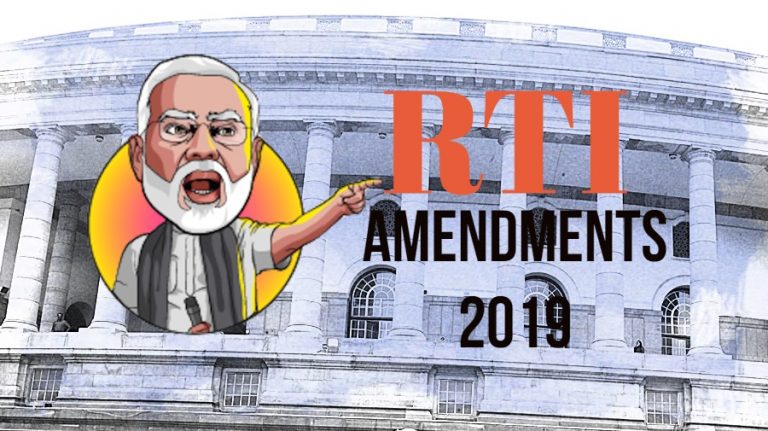It is the duty of the legislature, be it Central or State, to enact or amend laws. This enactment and amendment take place as per societal requirements or changing social circumstances. The legislature, as our representatives in the Parliament, keep enacting and amending several legislations in its wisdom. But, there are certain laws that emanate out of Social Movements, because of the people’s pressure or on account of common men coming to streets to demand the enactment of a law that they immensely require.
The ‘Right to Information Act’ is one such legislation. It has borne out of the people’s movement. The initial fight for this law had started way back in 1992 itself, from a small village named ‘Devdungri’ under Rajsamand district of Rajasthan. Thus, this law becoming a reality had seen a protracted struggle. The farmers, laborers, women, journalists and different kind of stakeholders had participated in this public movement to get the ‘Right to Information Act’ enacted.
This long struggle culminated in the enactment of this law in 2005, when the Parliament of India enacted ‘Right to Information Act, 2005’. Since its enactment, it has strengthened democracy like never before. It has given power to an ordinary citizen to hold even the highest office of this country to account.
Emphasizing on the need and importance of Information in a democratic society, one of the framers of the American Constitution, James Madison had opined: “Knowledge will forever govern ignorance and a people who mean to be their own governors must arm themselves with the power which knowledge gives. A popular government without popular information or the means of obtaining it is but a prologue to a farce or tragedy, or perhaps both.”
The ‘Right to Information’ is the manifestation of a mature democracy. No nation can claim itself to be democratic unless it guarantees its citizens the right to freedom of speech and expression and no citizen can express himself properly unless he has the requisite information. Thus, one’s access to information is essential to one’s right to expression. One cannot express properly until he has relevant information. Therefore, Right to Information is a Constitutional guarantee and democratic essentiality.
But, the RTI Act, ever since its enactment in India, has been a cause of great grief for the Indian bureaucracy and politicians, as, through it, the people use to hold them accountable. Those government officials and their political bosses who once used to consider themselves unquestionable now need to rethink again and again about the existence RTI and the possibility of being questioned through it at a later stage, before they proceed to take any arbitrary or illegitimate move.
This is the reason that there had been numerous attempts at its onslaught since its very enactment but all the attempts at its onslaught earlier had failed due to people’s pressure and the protest from the civil society. This time, the attempt at its onslaught got successful in the present regime under the leadership of Narendra Modi. The current ruling dispensation became successful in diluting the very spirit of this legislation. The Government has amended the ‘RTI Act’. This amendment effectively reduces the independence of the ‘Chief Information Commissioners’ as well as the other ‘Information Commissioners’, the highest adjudicating body under the ‘RTI Act’.
In its original and present form, the ‘Term of office and Conditions of Service’ of ‘Chief Information Commissioners’ and other ‘Information Commissioners’ are governed by section 13 of the ‘Right to Information Act’. It provides sufficient independence to the CIC and other ICs to discharge their legal duties without any sort of hindrance or external interference.
The first part of subsection 1 of Section 13, stipulates that:
“The Chief Information Commissioner shall hold office for a term of five years from the date on which he enters upon his office and shall not be eligible for reappointment: Provided that no Chief Information Commissioner shall hold office as such after he has attained the age of sixty-five years.”
Subsection 2 of Section 13 conveys the same abovementioned point with respect to other ‘Information Commissioners’. Subsection 5 of Section 13 stipulates that:
The salaries and allowances payable to and other terms and conditions of service of—
(a) The Chief Information Commissioner shall be the same as that of the Chief Election Commissioner.
(b) an Information Commissioner shall be the same as that of an Election Commissioner:
After this amendment in the ‘Right to Information Act’, the Central government has now acquired authority to regulate the services conditions of the Chief Information Commissioner & other Information Commissioners. This includes regulating their salaries, tenure and other terms of services. Such services conditions for State Information Commissioners will also be regulated by the Central government now. This, in my opinion, is indeed a serious invasion on the federal democratic structure of our Country.
As it is evident from the content of section 13 that the CIC and other ICs have a fixed tenure of 5 years after they enter into the office. This fixed 5 years tenure can only be shorter in case they attain 65 years of age earlier. The section also provides that the salaries, allowances and other terms and conditions of service of the CIC shall be the same as that of the Chief Election Commissioner and the salaries, allowances and other terms and conditions of service of the ‘Information Commissioners’ shall be the same as that of the Election Commissioner.
The salaries, allowances and other terms and conditions of services of CIC and ICs could not be varied to their disadvantage after their appointments as per the original piece of legislation but now it can be. After this amendment, the governments get right to regulate these service conditions. This, in turn, shall prove to be a massive blow to the independence of Information Commissioners.
The statement of Object and Reasons of the Bill that has now turned into law stated that ‘The mandate of Election Commission of India and Central and State Information Commissions are different and therefore their status and service conditions need to be rationalized accordingly.’ It means that the chief contention of the Central Government is that the CIC and ICs cannot be equated with CEC and ECs because the former is a statutory body and latter is a Constitutional one.
This argument is fundamentally fallacious on account of multiple reasons. For instance, the ‘Central Vigilance Commission, Act, 2003’ stipulates that the salaries, allowances and other terms of services of the CVC and VCs will be equal to that of the Chairman of UPSC and members of the UPSC respectively. It is clear that UPSC too is Constitutional body. Here, equivalence has been made.
Similarly, in the Lokpal Act, the salaries, allowances and other terms of services of its members have been made equal to that of the CJI and other judges of the Supreme Court. So, here also an equivalence has been made. In ‘The Protection of Human Rights Act, 1993’ again such an equivalence has been created. This type of equivalence is generally created to accord greater autonomy and independence to a statutory body. Moreover, such equivalence does not violate any Constitutional or legal provisions.
The government also claimed that it is not interfering with the appointment committee and has included the leader of the opposition to represent the Loksabha. This is a ludicrous logic, to begin with, because the ‘RTI Act’ in its original form already envisages through an explanation to subsection 3 of section 12 that:
“For the purposes of removal of doubts, it is hereby declared that where the Leader of Opposition in the House of the People has not been recognized as such, the Leader of the single largest group in opposition of the Government in the House of the People shall be deemed to be the Leader of Opposition.”
So, the originally framed ‘RTI Act’ was smart enough to deal with such probabilities and prospects. Congress MP Jairam Ramesh has too pointed out this fact in his eloquent speech in the Rajyasabha on ‘RTI amendment’ move.
The government also claims that it is not going to hamper the autonomy of the Commission. The fact of the matter is that no government can openly admit that it is going to hamper the autonomy of a statutory or a Constitutional body. Its real intention gets reflected in its actions and not the words. In the appointment committee of the CBI, leader of the opposition is there, but we can see how subserviently it functions. The highest Court of the land had to term it as a ‘Caged Parrot’.
Therefore, this is not difficult to understand that the government’s argument is just an excuse to snatch the independence of the highest adjudicating body under the RTI Act and make it a tooth-less body like some other Commissions. It is clear that the real intention of the government is to dilute the spirit of this important law that the people of this Country has got after a long struggle.
Further, Read More:



